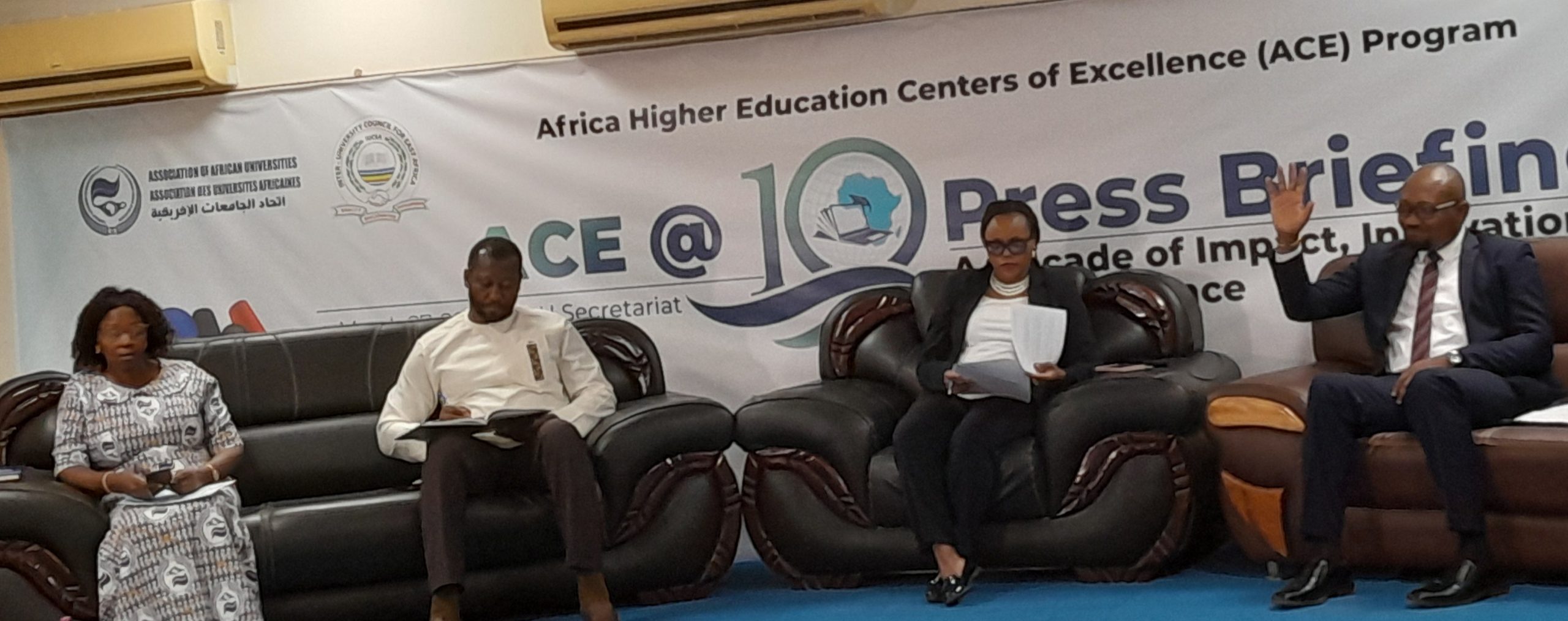
Accra, Ghana//-The Africa Higher Education Centers of Excellence (ACE) is partnering with the Association of African Universities (AAU) and the Inter-University Council for East Africa (IUCEA) to mark its 10th anniversary with a high-level forum from 7-9th April 2025.
The forum which is expected to attended by over 500 key stakeholders from African governments, higher education institutions including the ACEs, industry, development agencies, civil society, and the media would be held at the Labadi Beach Hotel in Accra.
The forum being organised with the support of the World Bank and the French Development Agency (AFD) aims to celebrate a decade of achievements.
The Communications Specialist of the ACE Impact Project at AAU, Mrs Millicent Afriyie Adjei, told journalists at the press conference that the forum would also highlight key successes, research breakthroughs, and innovations and showcase data-driven insights, among others.
She added that the forum would be used as a platform for sharing best practices and reflecting on lessons learned, engaging stakeholders in discussing remaining challenges and opportunities for improvement based on the ACE experience.
Besides, discussing sustainability strategies, exploring policy frameworks, institutional reforms, and financing modalities to sustain and expand ACE achievements and impact would all be discussed at the forum.
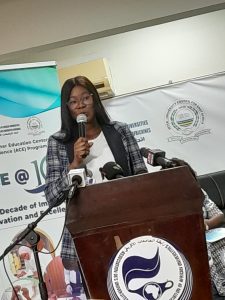
The forum according to Mrs Adjei and other speakers would engage development partners and chart the future, through dialogue with governments, industry leaders, and international partners, soliciting their continued support, and discussing opportunities for future collaboration.
This would enable the centers to shape and produce the next generation of African researchers, innovators, and entrepreneurs across the continent to accelerate its development and economic transformation.
In his welcome remarks via Zoom, the Secretary General of AAU, Professor Olusola Oyewole said the ACEs have supported more than 80 centers in over 50 universities across 20 African countries, benefiting thousands of postgraduate and PhD students with over one-third of them being women.
He added that the ACE program was also transforming education in the continent and called for concerted efforts on the various governments in Africa to support the program.
For the Senior Program Manager at the ACE Impact of the AAU, Dr Sylvia Mkandawire emphasised that the ACE programs had and continue to play a critical role in advancing higher education across the African continent.
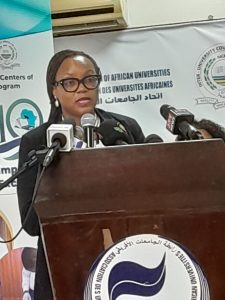
The program according to her is fostering specialised research and skills development in fields such as science, technology, engineering, and mathematics (STEM), agriculture, health, environment, and applied social sciences.
The Director of the West Africa Centre for Water, Irrigation, and Sustainable Agriculture (WACWISA) at the University for Development Studies (UDS), Prof Felix Abagale, observed that Ghanaian ACE centers had achieved an impressive minimum performance rate of 97% in meeting their objectives.
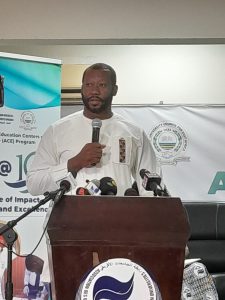
WACWISA he said had trained students from over 20 African countries, equipping them with specialised skills in irrigation and drainage engineering which is critical for boosting food production.
While Prof Eric Antwi Ofosu, Director of the Regional Center for Energy and Environmental Sustainability (RCEES) at the University of Energy and Natural Resources threw more on the impact of ACE funding on research output in Ghana and beyond.
Prof Ofosu revealed that before the program’s inception at his university located in Sunyani in the Bono regional capital, the university had 57 average publications annually, whereas with ACE support, research publications have surged to over 400 per year.
RCEES has also exceeded its initial targets by admitting 114 PhD students and 216 master’s students while training over 456 industry professionals through specialized short courses, he said.
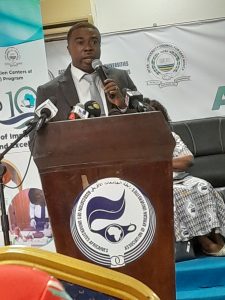
It was also revealed by the various speaker at the press conference that the ACE program had significantly enhanced the international visibility of many African universities, with several institutions obtaining international accreditation to ensure that their graduates compete favourably on the global stage.
Background
The Africa Higher Education Centers of Excellence (ACE) program is the first large scale regional program funded by the World Bank in the higher education sector in Africa.
Through a series of three projects – ACE1 (2014-2020); ACE2 (2016 to date); and ACE Impact (2019 to date)— the program has supported competitively selected ACEs with specializations in regional development priority areas to deliver high-quality postgraduate training, skills-upgrading for professionals, applied research, entrepreneurship and innovation in priority sectors such as science, technology, engineering and mathematics (STEM), agriculture, health, environment, and education.
Across these projects, the World Bank has committed a total of US$657 million in support to participating governments, with an additional co-financing of US$72 million equivalent from the French Development Agency (AFD) for the ACE Impact project.
In total, the ACE Program has supported some 80 centers in more than 50 universities across 20 countries in sub-Saharan Africa.
By leveraging economies of scale, with the support of regional bodies and governments of hosting countries, through enhancing teaching/research facilities, sharing good practices in teaching and learning, promoting cross-border collaboration and research networks, as well as collectively addressing the needs of higher-level skills and research/innovation for the priority sectors, these ACEs have achieved remarkable results.
They significantly expanded the capacity of postgraduate training with an enrolment of more than 77,000 students (including over 6,900 PhDs and 27,500 Masters), over 26% of whom are female.
They increased research output with over 9,200 publications, increased sustainability with self-generated over US$175 million external revenues, improved linkage with industries with more than 13,400 internships, and enhanced academic quality with 500 programs nationally accredited and over 100 programs internationally accredited.
Building on this success, the ACE Program is working with partners and mobilizing resources with a focus more on sharing best practices, strengthening further institutional capacities, fostering entrepreneurship, innovation and technology transfer, and promoting further in-country and cross-border collaborations, in priority sector areas, for greater impact.


